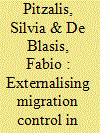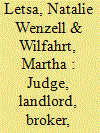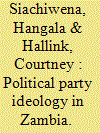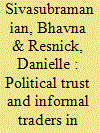|
|
|
Sort Order |
|
|
|
Items / Page
|
|
|
|
|
|
|
| Srl | Item |
| 1 |
ID:
193274


|
|
|
|
|
| Summary/Abstract |
The article investigates the role of the International Organization for Migration (IOM) in the global migration regime against the backdrop of the European Union (EU) border externalisation process in Niger. Over the last few years, UN agencies have been considered an essential component of the EU strategy to prevent irregular migrants from reaching Europe. Drawing on qualitative research and ethnographic fieldwork, combining empirical observation with critical analysis, we explore the ‘humanitarian–security nexus’ by focusing on the IOM's ‘humanitarian borderwork’ under the financial umbrella of the Emergency Trust Fund for Africa (ETFA). While the results of purely securitarian measures in Niger may have been ‘disappointing’, the outsourcing of migration management through IOM balances the interests of the Nigerien government and the EU. By focusing on IOM humanitarian operations and assisted voluntary returns and reintegration (AVRR) programmes, the article shows the further expansion of European humanitarian borders into the heart of the Sahel, highlighting new interdiction practices, hidden forms of deportation, side effects and contestation from below.
|
|
|
|
|
|
|
|
|
|
|
|
|
|
|
|
| 2 |
ID:
193277


|
|
|
|
|
| Summary/Abstract |
This paper seeks to broaden the framework for understanding the many different roles that traditional leaders play in their communities in sub-Saharan Africa. Using data from an original public opinion survey along the Ghana–Togo border, we find that one of the most important roles of the chieftaincy is to maintain law and order: resolving disputes and keeping the community safe from crime. However, we also find considerable variation in what chiefs are expected to do, how effective they are performing their various tasks, and how much authority they wield in doing so – both over their own subjects as well as over local government officials. We explore several potential sources for this variation, finding that chiefs in Ghana, a former British colony, are expected to do more jobs, are perceived to be more effective, and hold more upward power over local state officials compared with their counterparts in Togo, a former French colony.
|
|
|
|
|
|
|
|
|
|
|
|
|
|
|
|
| 3 |
ID:
193272


|
|
|
|
|
| Summary/Abstract |
This paper challenges existing analyses of party cleavages in Sub-Saharan Africa which over-emphasise the centrality of ethnicity. Parties express ideological positions that reflect the socio-economic interests of specific regions, which, especially in Zambia, coincide with particular ethnic groups. We demonstrate this through an examination of party manifestos, policy documents and semi-structured interviews with members of two political parties in Zambia – the Patriotic Front and the United Party for National Development. These parties express clear normative ideas about social welfare, especially the role of the state in providing social assistance to the poorest. These ideological positions reflect the socio-economic interests of the ethnic groups and regions where support for each party is dominant. These are shaped by the ways in which these regions were historically incorporated into the colonial economy. In order to gain a better understanding of African politics, ethnicity must be conceptualised as a socio-cultural construct and situated historically.
|
|
|
|
|
|
|
|
|
|
|
|
|
|
|
|
| 4 |
ID:
193275


|
|
|
|
|
| Summary/Abstract |
How do cities foster political trust among informal workers? This question is particularly salient in Africa's growing cities where local governments must reconcile policy priorities across highly heterogeneous constituencies, including a burgeoning middle-class and a large informal economy. We argue that expectations about reciprocity and procedural justice shape the probability that informal traders trust their local government. In doing so, we analyse a survey of approximately 1000 informal traders in Ghana's three main cities – Accra, Kumasi and Tamale. We find that traders who paid requisite fees to local assemblies and could attribute a benefit from those payments were more likely to trust their local government while those who had experienced harassment by city authorities were less likely to do so. The paper highlights that drivers of trust among diverse urban constituencies deserve greater empirical and comparative attention, especially as countries deepen decentralisation initiatives and cities commit to development goals around inclusivity.
|
|
|
|
|
|
|
|
|
|
|
|
|
|
|
|
| 5 |
ID:
193273


|
|
|
|
|
| Summary/Abstract |
Somalia has a long history of famine and humanitarian crisis. This article focuses on the years 2008–2020, during which governance and aid practices changed substantially and which include three crisis periods. The article examines whether and how governance analysed as a political marketplace can help explain Somalia's repeated humanitarian crises and the manipulation of response. We argue that between 2008 and 2011 the political marketplace was a violent competitive oligopoly which contributed to famine, but that from 2012 a more collusive, informal political compact resulted in a status quo which avoided violent conflict or famine in 2017 and which functioned to keep external resources coming in. At the same time, this political arrangement benefits from the maintenance of a large group of displaced people in permanent precarity as a source of aid and labour.
|
|
|
|
|
|
|
|
|
|
|
|
|
|
|
|
| 6 |
ID:
193276


|
|
|
|
|
| Summary/Abstract |
Sudan has for decades been one of Africa's most fragmented polities. Yet arguably the single most consequential actor in its recent history is among the least well studied: the Sudan Armed Forces (SAF). For most of post-independence statehood, Khartoum has been ruled by generals. This article places SAF in a longitudinal context of the expansion and contraction of state power and the functions of the coercive apparatus in these processes. It situates SAF in institutional logics, driven by historically contingent ideas about the nature of the polity, the role of the army within it and its likely partners and enemies. Doing so historicises the strategic calculus of SAF during the 2018–2019 December Revolution which mobilised millions but ended with a new coup in October 2021. I underscore how institutionalised rivalry between SAF and other security services has moulded patterns of regime change and consolidation: from Ja'afar Nimeiri and Omar Al-Bashir to Abdelfatah Al-Burhan today, anxieties over security competition and state fragility shape SAF's willingness to break with regimes it once dominated and its subsequent subversion of revolutionary change and democratisation.
|
|
|
|
|
|
|
|
|
|
|
|
|
|
|
|
|
|
|
|
|